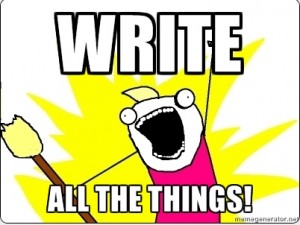 I have been teaching for long enough now that I’ve seen certain patterns recur in the work of new writers. One that pops up frequently is a valiant attempt to make a book’s main character something other than a lily-livered, virtuous bore. This is entirely worthwhile, but in the process some of us make those characters entirely unlikable, right there in the early chapters of the book, just when we readers are deciding whether we want to spend 300+ pages in their company.
I have been teaching for long enough now that I’ve seen certain patterns recur in the work of new writers. One that pops up frequently is a valiant attempt to make a book’s main character something other than a lily-livered, virtuous bore. This is entirely worthwhile, but in the process some of us make those characters entirely unlikable, right there in the early chapters of the book, just when we readers are deciding whether we want to spend 300+ pages in their company.
Sometimes they’re just plain whiny.
I’ll grant that your average protagonist has a lot to whine about. They’ve always got a midlife crisis on, or a dying parent, or some post-apocalyptic dystopia to survive. But whining, as we all know, is hardly ever attractive.
In other books, we meet characters so alienated from everyone else on earth that they come across as entirely misanthropic, utter people-haters. In still others, the attempt to establish a character as a legitimate action-adventure badass is so successful that the writer creates what comes across as a remorseless killing machine. The result? A casual approach to violence, a character who does terrible things for seemingly little reason. It’s stunningly easy to make an action hero, a tough character whom you as the writer like a lot, seem sociopathic to attentive readers who are just making their acquaintance.
In attempting to give their hero or heroine dimensions (she said, belaboring) some authors create a first impression of that protagonist that is almost wholly off-putting.
When I see this in a class, I’ll mention that I’m not feeling the love. The author will reply, reasonably enough, by stating a truth: not all books have sweethearts for protagonists.
This is absolutely true.
I’m not saying that every novel should open with a scene where its recently-bathed and perfectly turned out main character engages in a spontaneous, heartwarming puppy rescue while on their way home from choir practice. But by the same token, I don’t necessarily want to join a fictional stranger midway through their epic Friday night drinking fest, wherein they nastily humiliate the pregnant barkeeper and steal her tips before heading home, spitting on the homeless all the way and then kicking out their spouse. I’ll probably give up on someone like this long before they get to having a big drunken pity-inducing sigh over the fact that the old folks’ home is forcing them to take in both demented, elderly parents. And plus, they got fired.
Look for just a wisp of middle ground, in other words. Give some thought to letting readers like some teeny little thing about your main character. Intrigue us, early on in the book, even if they’re not all that cuddly. Give us just a glimmer of a hint of their underlying merit, their intellect or humanity.
Introducing your main character to your readers is, in a sense, asking them to embark on a new relationship. You’re making this person as real to them as you can. Once someone’s real, there’s room to maneuver. How many of you have forgiven a friend or relative some behavior you simply wouldn’t accept from a stranger?
We all do it. We forgive because we have bonded. We cut our loved ones slack because they are our loved ones. We give them the benefit of the doubt, even when they’re at their worst, because we have a history with them, one that has made us fully aware of their good qualities. We know them, and we know there’s more to them.
This is the same thing we’re looking to create with our characters in fiction. Readers will make allowances for their flaws and mistakes if you’ve created some little tie that either interests them or makes them care.
Have your MC make a striking first impression, buy just a little reader patience, and ramp up the character flaws once everyone’s hooked.
Okay, some of you may argue, but my character’s just not nice! They’re cool, or edgy, or a hard-bitten soldier, or bent on conquering Europe.
We don’t want our characters to be Pollyanna. Flawless martyrs are boring; flawless polymaths get derided for being Mary Sues.
This brings us to the title of this essay: Funny, Smart or Nice. (Or, perhaps, Funny, Smart, or Nice.) FSN is the idea that readers will usually form that first thread of a tie to a fictional person if they have at least one of the above qualities.
Nice, this thing many of us shy away from, probably seems self explanatory. But let’s glance through it: often the main character of your book *is* a reasonably good person. Think of Bridget Jones. Captain Aubrey, Elizabeth Bennett, and Atticus Finch. In this case, if we don’t like them, it’s perhaps just a matter of trotting out their demonstrable generosity of spirit earlier in the story. You don’t say John Smith is a supremely nice person, honest! You do show the puppy rescue. Having done that, you can probably introduce a bit of whine or pettiness in the next scene. Or even within the interior monologue as they’re handing Mitzi back to her grateful owner.
One bonus of nice is that it usually involves interacting with someone else. This gives you a chance to introduce us to a second character.
But enough of nice for now! We’re tired of nice, right? That’s what got us into this. So, next, there’s smart.
They key to understanding smart is knowing that expertise is sexy, plain and simple. A character who’s really good at something, and who is passionately engaged in doing that something, will have an attraction that will engage a reader even if they are maybe not so supernice. Consider the enduring appeal of Sherlock Holmes. He’s bad with people, but he cares desperately about the puzzles he’s solving… and there’s nobody better. Or going back to our hypothetical killing machine. We’re likely to feel a certain grudging respect if what they’re doing is tactically difficult, something much harder than just spraying a city block with machine-gun fire.
Another useful story element built into smart is it it involves doing something. Your character is active and there’s at least a chance that they’ll fail. This question–will they pull it off?–creates suspense. Think of any dysfunctional TV cop. They’re an expert at solving crimes, we as audience members want to see them succeed, and we’re willing to cut them a lot of slack on oft-enormous flaws.
Finally, and often most difficult, is funny. Even an out and out bastard can get us on their side, sometimes, if they keep us laughing. The hypothetical Friday night binger I mention above might keep us reading if his or her ‘humiliate the bartender’ monologue is hilarious. If you really want a mean character and you can pull it off in a funny way, we’ll stay for the laughs. We may hate ourselves a little for it, but before we know it we’ll be a hundred pages into your book and begging for more. Chuck Palaniuk is masterful at this, creating stomach-turning situations with characters who, at least on the face of it, seem quite distasteful… but who get us laughing and involve us in their stories. Or consider Oscar Wilde’s Lady Bracknell, from The Importance of Being Earnest. She’s hilarious. We love it when she’s onstage. And yet, really, she’s something of a hag.
Humor can be hard, but you can slide a lot of not-so-great behavior past a reader’s early-novel radar when you pull off this particular kind of charm.
And once you’ve earned that little bit of slack from readers, once they’ve opened the door on liking your characters a little, you can trot out some balancing weakness or wickedness. This is a constant dance… one nice act won’t buy a character a cold-blooded murder. Think of it as an emotional economy for your novel. You earn the Funny, Smart, Nice coupons and your protagonist spends them on reader patience.
The worse they behave, the more you’ll probably need to earn.
Thomas Harris, for example, gets his evil coupons by having Hannibal Lecter be both smart and funny. He’s really good at being a serial killer. He’s got a creepy, thoroughly unnerving and undeniable wit. The sales figures show that readers love him, with or without Clarice Starling.
A few other things that can draw reader sympathy.
–Your characters’ choices aren’t truly their own. They’re slaves, prisoners, victims of blackmail, or kids whose parents have total control over their lives. How many children’s stories start with a depiction of a child’s hellish life at home with abusive guardians?
–The character is a victim of undeserved misfortune. In a similar vein, we can usually be led to feel bad for a fictional person who’s taking a beating for something that’s obviously not their fault.
–The character has a really tough and important task to accomplish. Maybe they’re unpleasant, but they are trying to save the world here.
–The character believes sincerely they are doing the right thing, even if the reader disagrees.
–Perhaps most importantly, the character should have some realistic emotional responses to all their behaviors and its consequences. The good character who behaves badly feels remorse. The funny character who tends to be a little (or a lot) mean is holding people away as a self-protective measure, because of some previous hurt. Maybe they even feel a teeny twinge of guilt when they make that bartender cry. The messed-up TV detective whose romances inevitably end badly has their head too far in the world of murder… but they’re so damned lonely they keep trying again.
As you develop a novel and begin to think about its characters, in all their multi-dimensional and perhaps messed-up glory, consider what facet you’re going to show readers first. If you can offer some glimmer of one of these qualities, be it super-competence, a hilarious voice or yes, even a rare-for-them instance of kindness, you will get that reader-hero relationship off on the right foot.
Which route will you go, with the next project?









Awesome news – congratulations!!!
Thank you, Tina!
Oops – my congrats were meant for the blog post regarding your new series, but I guess you figured that out! (I swear I do know how to operate a mouse and keyboard)